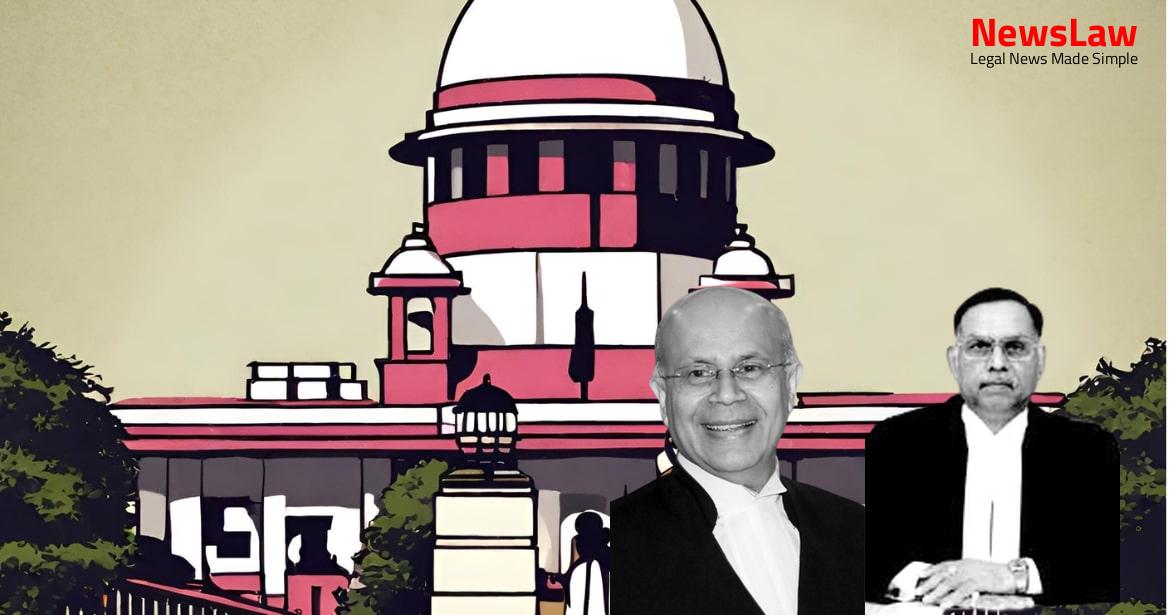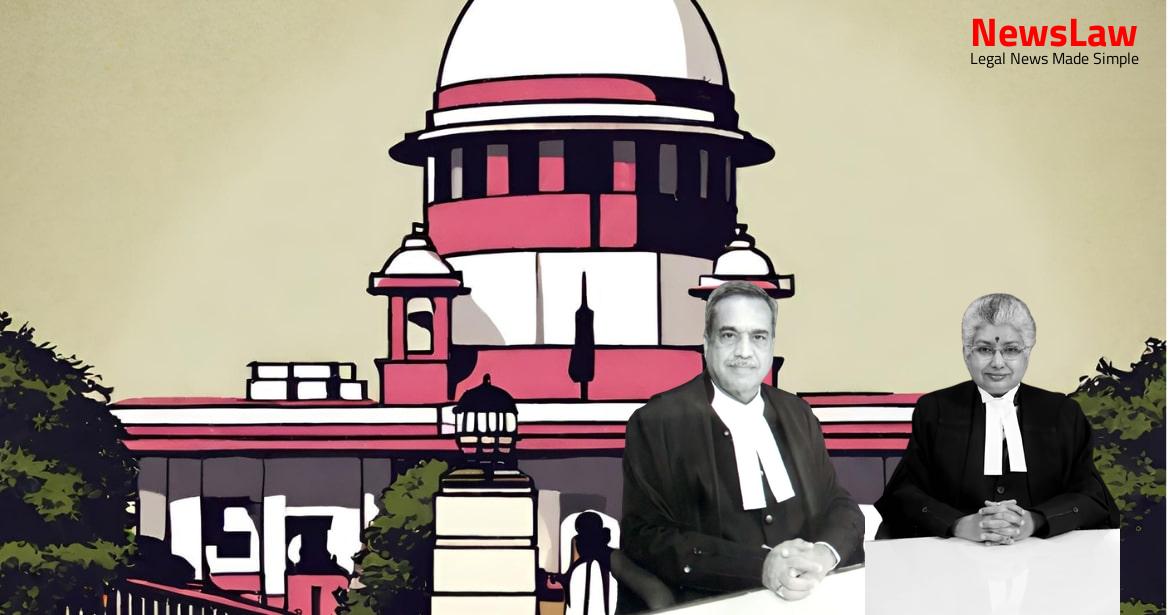A landmark Supreme Court judgment was delivered in the case of Central Bank of India vs. Tara Chand, focusing on pension eligibility under the voluntary retirement scheme. The case involved a dispute over whether Tara Chand, who opted for the pension scheme upon voluntary retirement, was eligible to receive pension benefits as per the regulations. The Court’s decision has significant implications for employees seeking pension post voluntary retirement.
Facts
- The Central Bank of India challenged the judgment of the Rajasthan High Court’s Division Bench dated 09.03.2017
- A voluntary retirement scheme called Central Bank of India Employees Voluntary Retirement Scheme, 2001 was framed from 22.02.2001 to 08.03.2001.
- A circular was issued on 31.01.2001 by the Bank to clarify matters regarding the Scheme’s implementation.
- Tara Chand opted for the pension scheme and the Bank accepted this choice.
- The Bank refused to grant pro-rata pension to Tara Chand upon his retirement under the Scheme, 2001.
- Tara Chand filed a Special Appeal against this decision.
- The Single Judge ruled in favor of Tara Chand, stating that he was entitled to pension as per Pension Regulations, 1995.
- The Bank accepted Tara Chand’s application for voluntary retirement on 26.03.2001.
- Bank of India vs. K. Mohandas & others judgment (2009) 5 SCC 313 was relied on by the Division Bench.
- Judgment allowed the writ petition and set aside the order dated 12.06.2001.
- Bank filed a Special Appeal which was also dismissed by the Division Bench.
- The respondent above 40 years and with 11 years of service was entitled to opt for voluntary retirement and claim pension under the Scheme.
Also Read: Dispensation with Personal Appearance in Criminal Case: Landmark Judgement by Supreme Court of India
Arguments
- The appellant argues that voluntary retirement under the Scheme, 2001 only makes an employee eligible for pension as per Regulations, 1995.
- The respondent, having completed 11 years of service, is deemed eligible for pension according to Regulation 29 of the Pension Regulations.
- The appellant contests that eligibility under the Scheme, 2001 does not automatically grant the right to receive pension.
- In cases of voluntary retirement, Regulation 29 is argued by the respondent to not apply, but rather Regulation 14.
- Citing Regulations, 1995, the appellant asserts that an employee with a minimum of 10 years of service is qualified for pension.
- Referring to the Bank of Baroda case and other precedents, the appellant builds his case on pension regulations and voluntary retirement schemes.
- The respondent, aged 40 and having not completed 15 years of service, is claimed by the Bank to be ineligible for pension.
- The appellant leans on judgments like Bank of Baroda vs. Ganpat Singh Deora to support their argument against the respondent’s pension eligibility.
- The respondent’s eligibility for pension, as per the Scheme and Regulations, is strongly defended by their counsel.
- The respondent applied for pension in 2001 and has been waiting for 18 years.
- Dr. Singhvi, the learned senior counsel for the respondent, argued that due to this long delay in receiving pension, the impugned judgment of the High Court should not be interfered with.
- Dr. Singhvi cited the judgments of the Supreme Court in Bank of India vs. K. Mohandas and National Insurance Company Limited vs. Kirpal Singh to strengthen his argument.
Also Read: Case of Unnatural Death in Matrimonial Home: Supreme Court Judgment
Analysis
- The court considered the SVRS Scheme, 2004 and noted the retention of 15 years as the qualifying service for employees opting for BOBEVRS-2001.
- Regulation 28 was amended in 2002 to allow employees retiring before superannuation with a minimum of 15 years of service to be entitled to pension.
- The respondent in this case was found ineligible for pension under the Pension Regulations, 1995, as they did not meet the required length of qualifying service.
- The court distinguished between Clause 6(ii) of the Scheme 2001 and Regulation 14 of the Pension Regulations, 1995, in terms of eligibility for pension in different situations.
- Qualifying service of 10 years is relevant for individuals completing 10 years of service at the time of retirement.
- Regulation 29 of Bank of Baroda Regulations provided for pension on voluntary retirement, with a qualifying service period of 15 years for those choosing premature retirement.
- Employees seeking voluntary retirement under the Scheme are eligible for additional benefits like gratuity, pension, and leave encashment.
- Entitlement to pension under the Scheme is to be as per Central Bank of India (Employees’) Pension Regulations, 1995.
- Regulation 14 of the Pension Regulations states that an employee with a minimum of ten years of service at the time of retirement qualifies for pension.
- Voluntary retirement under the Scheme is not covered under the definition of retirement in the Pension Regulations.
- The Regulations require completion of 15 years of service and a notice period of 3 months for superannuation pension.
- Regulation 29 does not apply to voluntary retirement under the Scheme but to employees wishing to retire after completing 15 years of qualifying service.
- There is a distinction between voluntary retirement under the Scheme and retirement under the Pension Regulations.
- Amended Regulation 28 of the Pension Regulations clarifies the requirements for superannuation pension.
- In Bank of Baroda, the employee did not complete qualifying service of 20 years, making the decision distinguishable.
- The Scheme considered in Bank of Baroda is similar to that of Central Bank of India in 2001.
- The judgment in Bank of Baroda vs. Ganpat Singh Deora is followed and considered binding in the present case.
- The employee in Bank of Baroda had completed only 13 years of service and was not eligible for pension under the Pension Regulations, 1995.
- Under the General Insurance Business (Nationalisation) Act, eligibility for the Scheme required employees to be at least 40 years old and have completed 10 years of qualifying service.
- The judgment of Bank of Baroda vs. Ganpat Singh Deora was distinguished on its facts in the present case.
- A larger bench referral was not deemed necessary due to the existing two-judge bench judgment on similar Regulations and Scheme.
- The judgment in National Insurance Company Limited vs. Kirpal Singh is heavily relied upon by Dr. Singhvi, which references the Bank of Baroda vs. Ganpat Singh Deora case.
- The judgment in Bank of India vs. K. Mohandas is distinguished and not applicable.
- Various paragraphs from the judgments are cited for reference and clarification.
- The judgment on which much reliance has been placed by the learned counsel for the respondent is Bank of India and another vs K. Mohandas and others
- The judgment in the case of Regional Manager, Punjab National Bank and another vs. Dharam Pal Singh and Punjab National Bank and others vs. Ram Kishan was followed
- This part of the judgement is pre-not relied upon
- The High Court’s interpretation of the Scheme and Regulations was deemed incorrect.
- Despite the respondent waiting for pension for 18 years, the statutory regulations must be adhered to when interpreting benefits for employees.
- No exceptions can be made based on the individual’s case when it comes to statutory regime in the Scheme.
Also Read: The Jodha Ram vs. Kaushaliya Dispute: Supreme Court Judgement Summary
Decision
- Parties shall bear their own costs.
- The submission of the learned counsel for the respondent is not accepted.
- The appeal is allowed.
- Judgments of the High Court are set aside.
- The writ petition filed by the respondent is dismissed.
Case Title: CENTRAL BANK OF INDIA Vs. TARA CHAND
Case Number: C.A. No.-005898-005898 / 2019



